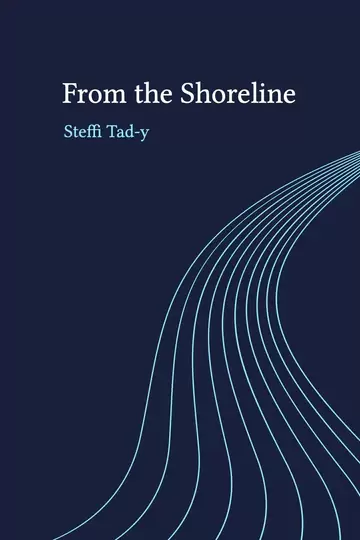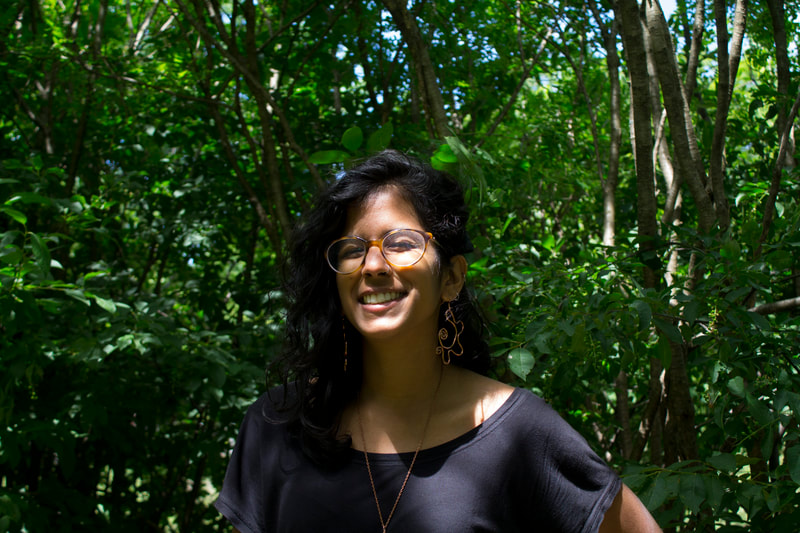|
|
Steffi Tad-y’s debut poetry collection, From the Shoreline, evokes the stillness of watching both the difficult moments of life along with the small moments of love from the vantage point of a shoreline. Comprised primarily of short, breathless poems, Tad-y brings tenderness even when writing about painful diasporic experiences.
The first poem in the collection, “Night Ships at the Port,” poses the following questions but drops the question marks: “What cargo / do I carry // What weapons have I held” (3). Leaving the answers rhetorical, Tad-y immediately folds the reader into this world, where we watch with the speaker from the shoreline. In the astounding poem, “Duplex Ukol Sa Utang Na Loob,” Tad-y writes in the duplex form created by American poet Jericho Brown. The poem opens and closes with the line, “I was scared my anger meant I was unlovable” (11). In the rest of the poem, Tad-y uses slight variations on the paired lines, leaning on rhymes and assonance to make the poem fit with the speaker’s anger. She rhymes the word “pomegranate” with “detonate,” then brings the word “detonate” back into the poem some lines later. She writes about the intersection of witnessing violence and feeling anger: “I was the child of explosion after explosion. / What does it mean to witness an explosion? Carry it home?” (11). From this intersection comes the statement posed in the first line of the poem, and again repeated at the end: whether anger makes one unlovable, and the unshakeable fear that it does. The collection’s title comes from the poem, “Flickering,” in which the speaker recounts the experience of trying to find out their family’s medical history. The speaker finds a sense of connection with this uncle in imagining shared medical experiences. Tad-y writes, “With tattered medical records peeking out of his bag, / we’d trade stories about the ward and drape them / around our shoulders like a prayer” (12). In this image evoked in the speaker’s mind, these records are no longer something to hide but something to wear and to share. This feeling of connection appears in the last couplet of the poem, where “From the shoreline, we’d recount what we love” (13). The fact that the title comes from a line about love speaks to the tenderness underlying the entire collection. Though there is anger and violence and shame, there is also love, and this love exists in abundance. “Third Person Singular” is another poignant example of the tension between violence and love threaded through the collection. Tad-y writes:
Her play on the similar sounds of “violets” and “violence” gives the poem a beautiful rhythm, and also hints at how close the two are. Violence is difficult to write about, but writing about violets can be a way to get closer to the heart of the topic. Just as the rhetorical questions posed in the first poem that appear without question marks, the questions in these poems taper off. There is no answer to these questions (yet), but that does not stop Tad-y from asking them. They exist, like writing about violence does, as a “yet,” something that we will eventually be able to reach.
The notion of witnessing from the shoreline returns in the poem “Elegy from a Wave,” though in this poem the speaker addresses what they do not know: “I do not know what it is like / to line the shore with flowers” (26). The melancholic language is full of care and tenderness, as the speaker remarks how “In light of this / shortness of breath, I remember / those who speak to them at night” (26). Tad-y’s very words evoke a shortness of breath, once again pulling the reader in to stand along the shoreline, and walk and witness. In “Writer’s Archive,” words take on physical form that are stored inside a cloud. The storage of these words is a way to better sift and parse through them. This poem shifts into the surreal as Tad-y explores what happens when you mix unconventional words together. “You may lose face, but what happens / grows in you & gives you a vision” (42), she writes. Morning shifts from auburn to maroon in the word cloud, and overall there is a new outlook of assessing and addressing the words that build up everything. As the collection reaches its conclusion, Tad-y brings back the closeness between flowers and weapons. She wraps these two motifs into the explorations of words and language that appear in poems such as “Writer’s Archive.” For example, in the poem “Cruel Strokes,” she writes:
The threads that run through the collection make this a satisfying read. Tad-y brings a softness to spaces of violence that tempers the difficult moments. To write such grief and violence with such care is remarkable, and Tad-y does that with tremendous skill.
Manahil Bandukwala is a writer & visual artist. She is currently Coordinating Editor for Arc Poetry Magazine, & Digital Content Editor for Canthius. She is a member of Ottawa-based writing collective VII. Her collaborative chapbook with Conyer Clayton, Sprawl | the time it took us to forget (Collusion, 2020), was shortlisted for the bpNichol Award. Her debut collection, MON̶U̶MENT, is forthcoming with Brick Books in 2022.
|


